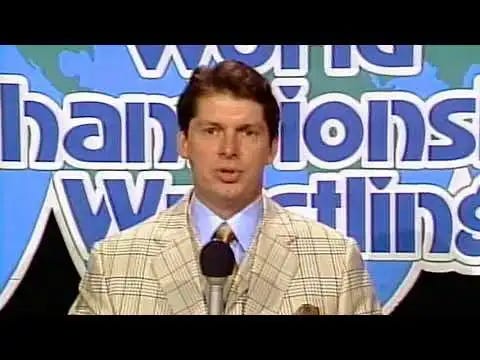McMahon out, our national nightmare finally over
Vince McMahon began his hostile takeover of pro wrestling 38 years ago this month. Having been forced into retirement by scandal, maybe the squared circle can finally make a comeback
It was July 14, 1984, Saturday evening and home from work or the golf course, my 16-year-old self sat down to watch what I frequently watched Saturdays at that hour.
After the highlights package and theme music, what I should have heard was the familiar voice of Gordon Solie, the broadcaster who made professional wrestling seem so real for so many promotions, but who I knew as the longtime voice of World Championship Wrestling, previously Georgia Championship Wrestling, broadcast each Saturday on super station WTBS, channel 17, out of Atlanta.
Only the week before they’d began the show announcing Ronnie Garvin and Jerry Oates had dethroned the Road Warriors of the national tag team championship belts.
The show included a bevy of stars: Ted DiBiase, the Assassins, Crusher Blackwell, Jake Roberts, the Spoiler, Nikolai Volkoff and then World Junior Heavyweight Champion Les Thornton.
Storylines were pushed.
Future live cards were advertised.
But Saturday the 14th?
No Solie.
None of those wrestlers.
Just Vince McMahon taking the mic from Freddie Miller, Solie’s sometime cohost, to explain there’d been a change.
McMahon had just bought the shares of several of GCW’s co-owners. Not to operate the promotion, but to shut it down and broadcast World Wrestling Federation matches in the same time slot on Ted Turner’s original superstation.
Maybe there were signs.
Oates and Garvin?
Oates once had a three-month turn as North American champion in Mid-South and Garvin was tough, but taking down the Road Warriors? Good chance, Ole Anderson, running the promotion until his co-owners sold him out, knew what was up and didn’t want Hawk and Animal taking the belts where they were headed next.
That and Iron Mike Sharpe won a squash match in that final pre-McMahon episode. Though a tough hombre, Sharpe never made it that big, leaving his match out of place.
So, in came McMahon with the opening foray of his hostile takeover of professional wrestling in this country. It was the beginning of the end of the National Wrestling Alliance’s territory system.
A crushing blow to fans, it’s still called Black Saturday.
It was the beginning of McMahon taking the “sport” mainstream, while doing all he could to kill it at the same time.
Though the WWF flourished on national television on two different outlets, USA Network and WTBS, regional promotions across North American were weakened and eventually died.
However, there’s now good news.
McMahon, 77, has fallen, retiring amidst a sex scandal, non-disclosure agreements and millions in payoffs, making his exit Twitter official four days ago.
Good riddance.
McMahon and his father before him, Vince Sr., did not adhere to the pro wrestling ethic practiced around here by Bill Watts’ Mid-South territory, nor by Fritz Von Erich’s Metroplex-based World Class, Eddie Graham’s Championship Wrestling from Florida, the Crocketts’ Mid-Atlantic, Jerry Jarrett’s Memphis based Continental Wrestling Association and about all the others’ too.
In those, it was about the fight. Over belts or personal grudges, it was mayhem and violence fueled by avarice that sure seemed real even if punches occasionally missed the mark.
In the WWF, it was personality, ethnicity and patriotism, from world champ Bruno Sammartino, to Intercontinental champ Tito Santana, to world champ and Intercontinental champ Pedro Morales, to world champ Bob Backlund, the All-American Boy, to, eventually, Hulk Hogan.
There was overlap.
But only so much.
The territories could feel dangerous.
Though the WWF could pack them in — easier to do in New York, Boston, Philadelphia and D.C., than Atlanta, Greensboro, Greenville and Tampa — it rarely felt like that.
And when McMahon grabbed control, the WWF went from predictable to silly.
His wrestlers were caricatures, from Hogan telling children to take their vitamins and say their prayers, to neutering the Sheepherders into the Bushwhackers, turning DiBiase into The Million Dollar Man, The Junkyard Dog into a joke and the awful Matt Borne into the absurdly stupid Doink the Clown.
He got the casual fan to buy action figures, perhaps, but killed wrestling as we’d known it, counting on it to come to town, our town, every week or two and appearing somewhere every night.
McMahon made it a spectacle, made himself a billionaire and killed the business.
Now, maybe, there’s an opening.
Forty years ago, we didn’t think it was real, but sometimes weren’t so sure and the rest of the time suspended our disbelief.
Wrestlers fought and bled.
Ric Flair, Dusty Rhodes, Terry Funk, Tommy Rich, Buzz Sawyer, Arn Anderson, Tully Blanchard, Ricky Morton, Robert Gibson, Bobby Eaton, Dennis Condrey, Jerry Lawler, Kevin Von Erich and dozens more spoke and acted exactly as you’d expect somebody in their portrayed position to speak and act.
There was no script.
There was no choreography.
Matches were booked.
The wrestlers took it from there.
Nobody did righteous indignation like Mr. Wrestling II. Nobody took a beating like Ricky Morton. Nobody went after a bounty like Bruiser Bob Sweetan. Nobody could say the coolest things like Ernie Ladd could say them, things like “I’d rather fight a man than make love to a woman.”
Nobody connected with the fans like the American Dream. Nobody could be as coldly ruthless as The Nature Boy.
They made us care.
For now, McMahon’s daughter, Stephanie, and her husband, Paul Levesque, aka Triple H, hold the reins.
The old man may still have influence. Also, the product’s been stale for a long, long time.
That and there must be millions of retired squared circle fans who’d dearly love to suspend their disbelief again.
We don’t even need a product we can believe in. Just one that tempts us to, like it used to, before Vince McMahon ruined it for everybody.





